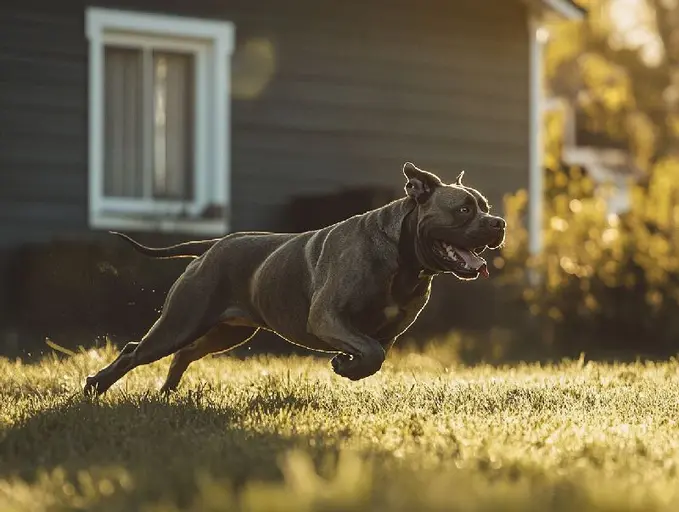The Cane Corso: A Comprehensive Guide to This Majestic Breed
![Everything you need to know about the Cane Corso! Learn about this powerful breed's history, temperament, care needs, and suitability as a family pet. Expert advice from [Clinic Name].The Cane Corso: A Comprehensive Guide to This Majestic Breed](/media/2025/04/cane-corso-breed-guide.webp)
Brief Introduction to the Cane Corso
The Cane Corso, also known as the Italian Mastiff, is a powerful and intelligent dog breed originating from Italy. Known for their muscular build and imposing presence, Corsos are loyal, protective, and eager to please, making them excellent companions for experienced dog owners. They possess a regal demeanor combined with an inherent instinct to guard their family and territory. Their history is rich and intertwined with the history of ancient Rome, adding to their mystique and appeal. What makes them particularly attractive is their unwavering devotion and their surprising gentleness with family members, including children, when properly socialized and trained. However, prospective owners should understand that the Cane Corso is not a breed for everyone and requires consistent training, socialization, and strong leadership.
Breed History: A Legacy of Strength and Courage
The history of the Cane Corso is deeply rooted in ancient Italy. They are direct descendants of the ancient Roman canis pugnaces, used in warfare and as guardians.
Origins and Early Roles
The Cane Corso’s lineage dates back to the Roman Empire. These dogs were used as:
- War dogs
- Guardian dogs
- Livestock herders
- Hunters of large game (such as boar)
They played a crucial role in protecting property and assisting with agricultural tasks.
Near Extinction and Revival
Over time, the breed’s numbers dwindled, and by the mid-20th century, it was nearly extinct. A dedicated group of Italian breeders recognized the importance of preserving this magnificent breed and began a focused effort to revive it. Through careful breeding and conservation, they successfully brought the Cane Corso back from the brink.
Modern Cane Corso
Today, the Cane Corso is recognized worldwide and cherished for its loyalty, intelligence, and protective nature. They have become popular as family pets, working dogs, and show dogs. Their history as versatile working dogs contributes to their intelligence and adaptability. But it also contributes to their need to have a “job” in life.
Appearance: Impressive and Powerful
The Cane Corso is a large and powerfully built dog. Their appearance reflects their strength and agility.
Size and Weight
- Height: Males typically stand 25 to 27.5 inches (63.5 to 70 cm) at the shoulder, while females range from 23.5 to 26 inches (60 to 66 cm).
- Weight: Males generally weigh between 99 to 110 pounds (45 to 50 kg), and females weigh between 88 to 99 pounds (40 to 45 kg).
Coat and Color
The Cane Corso has a short, dense, and slightly coarse coat. Common coat colors include:
- Black
- Fawn
- Gray (varying shades)
- Red
- Brindle (stripes on any of the base colors)
Some dogs may also have a black or gray muzzle mask.
Head and Facial Features
The head is large and molossoid, with a broad muzzle. The jaws are strong, and the bite is a scissors bite. The eyes are medium-sized, almond-shaped, and dark in color. Ears are traditionally cropped in many countries, but in some regions, it is illegal. Uncropped ears are triangular and drop forward. Distinctive facial features contribute to the dog’s alert and intelligent expression.
Tail
The tail is traditionally docked to approximately one-third of its original length. However, docking is becoming less common due to animal welfare concerns in some regions. An undocked tail is thick at the base and tapers towards the tip.
Character and Behavior: A Loyal Guardian
Understanding the Cane Corso’s temperament is crucial for prospective owners. They are known for their loyalty and protective instincts.
Attitude Towards People
Cane Corsos are devoted to their families and form strong bonds with their owners. They are generally wary of strangers, which makes them excellent guard dogs. Early socialization is essential to ensure they are comfortable around new people. Early and consistent socialization is key to building a well-adjusted dog.
Interaction with Children
When properly socialized and raised with children, Cane Corsos can be gentle and protective. However, due to their size and strength, supervision is always necessary, especially with young children. It is important to teach children how to interact respectfully with the dog.
Relationship with Other Animals
Cane Corsos can be assertive with other animals, particularly dogs of the same sex. Early socialization and training are crucial for establishing a positive relationship with other pets in the household. Supervised introductions are always recommended. Careful, slow introductions are essential for minimizing conflict.
Activity Level and Exercise Needs
Cane Corsos are moderately active dogs that require regular exercise to stay physically and mentally stimulated. Daily walks, playtime, and training sessions are important. They also benefit from having a job to do, such as guarding or participating in dog sports.
Trainability
Cane Corsos are intelligent and eager to please, but they can also be independent and strong-willed. Consistent, positive reinforcement training methods are most effective. Early obedience training is essential to establish clear boundaries and expectations. Consistent and structured training is paramount for success.
Breed Characteristics
Key personality traits include:
- Loyalty
- Protectiveness
- Intelligence
- Confidence
- Alertness
Care and Maintenance: Ensuring a Healthy and Happy Life
Proper care and maintenance are essential for the well-being of a Cane Corso.
Grooming Requirements
The Cane Corso’s short coat requires minimal grooming. Regular brushing helps to remove loose hair and keep the coat healthy. Bathing should only be done when necessary. Nail trimming, ear cleaning, and teeth brushing should also be part of their regular grooming routine.
Exercise Needs
Cane Corsos require a moderate amount of exercise to stay healthy and happy. Daily walks, playtime, and mental stimulation are important. They also enjoy activities such as:
- Hiking
- Jogging
- Playing fetch
- Obedience training
Feeding Guidelines
A high-quality dog food formulated for large breeds is recommended. The amount of food will depend on the dog’s age, activity level, and metabolism. It’s crucial to avoid overfeeding to prevent obesity, which can lead to various health problems. Discuss dietary needs with your veterinarian.
Health Considerations
Cane Corsos are generally healthy dogs, but they are prone to certain health conditions, including:
- Hip dysplasia
- Elbow dysplasia
- Gastric torsion (bloat)
- Eye problems (e.g., progressive retinal atrophy)
- Dilated Cardiomyopathy
Regular veterinary checkups and preventative care can help to detect and manage these issues. Choose a reputable breeder who screens their dogs for these genetic conditions.
Breed Weaknesses: Understanding Potential Challenges
It’s important to be aware of potential challenges associated with the Cane Corso breed.
Potential Aggression
Due to their guarding instincts, Cane Corsos can be prone to aggression if not properly socialized and trained. They require a confident and experienced owner who can provide consistent leadership and guidance. Early socialization is the best way to mitigate this tendency.
Loyalty and Dependence
While their loyalty is a positive trait, Cane Corsos can become overly dependent on their owners, which can lead to separation anxiety. It’s important to teach them independence from an early age.
Specific Weaknesses
Their size and strength can make them challenging to handle for inexperienced owners. They require a firm but fair approach to training. Their strong prey drive can also be a challenge when interacting with smaller animals.
Conclusion: Is the Cane Corso Right for You?
The Cane Corso is a magnificent breed that can be a wonderful companion for the right owner. They are best suited for experienced dog owners who can provide consistent training, socialization, and leadership. Ideal owners are confident, patient, and dedicated to meeting the breed’s unique needs. If you are prepared to commit to their training and care, the Cane Corso can be a loyal and devoted member of your family. However, if you’re a first-time dog owner or unable to provide the necessary structure and socialization, this may not be the right breed for you. Consider carefully whether you can meet the demands of this powerful and intelligent breed before bringing a Cane Corso into your home.
Frequently Asked Questions About Cane Corso
-
What is a Cane Corso?
The Cane Corso, also known as the Italian Mastiff, is a large and powerful dog breed originating from Italy. They are intelligent, loyal, and protective, making them excellent companions for experienced dog owners.
-
What was the Cane Corso originally bred for?
The Cane Corso’s ancestors were used as war dogs, guardian dogs, livestock herders, and hunters of large game in ancient Rome.
-
How big do Cane Corsos get?
Males typically stand 25 to 27.5 inches (63.5 to 70 cm) at the shoulder and weigh between 99 to 110 pounds (45 to 50 kg). Females range from 23.5 to 26 inches (60 to 66 cm) and weigh between 88 to 99 pounds (40 to 45 kg).
-
What colors do Cane Corsos come in?
Common coat colors include black, fawn, gray (varying shades), red, and brindle (stripes on any of the base colors). Some dogs may also have a black or gray muzzle mask.
-
Are Cane Corsos good with children?
When properly socialized and raised with children, Cane Corsos can be gentle and protective. However, due to their size and strength, supervision is always necessary, especially with young children.
-
How much exercise does a Cane Corso need?
Cane Corsos are moderately active dogs that require regular exercise to stay physically and mentally stimulated. Daily walks, playtime, and training sessions are important.
-
Are Cane Corsos easy to train?
Cane Corsos are intelligent and eager to please, but they can also be independent and strong-willed. Consistent, positive reinforcement training methods are most effective. Early obedience training is essential.
-
What are some common health problems in Cane Corsos?
Cane Corsos are prone to certain health conditions, including hip dysplasia, elbow dysplasia, gastric torsion (bloat), eye problems (e.g., progressive retinal atrophy), and Dilated Cardiomyopathy.
-
Are Cane Corsos aggressive?
Due to their guarding instincts, Cane Corsos can be prone to aggression if not properly socialized and trained. They require a confident and experienced owner who can provide consistent leadership and guidance. Early socialization is key to mitigating this tendency.
-
Is a Cane Corso the right breed for me?
The Cane Corso is best suited for experienced dog owners who can provide consistent training, socialization, and leadership. Ideal owners are confident, patient, and dedicated to meeting the breed’s unique needs. If you are a first-time dog owner or unable to provide the necessary structure and socialization, this may not be the right breed for you.

